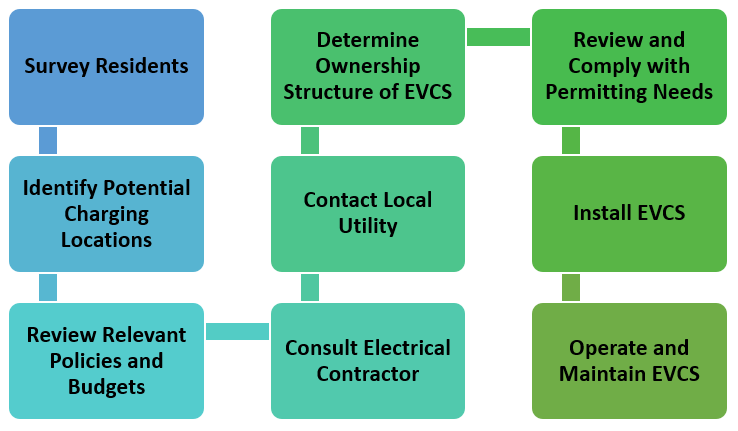Not every home or business may be set up for electric vehicle charging station (EVCS) installation. Installing charging infrastructure in multi-family residential buildings or communities with common access parking may be particularly challenging. In 2020, Virginia passed right-to-charge legislation, ensuring that homeowner and condominium associations cannot prohibit a resident from installing electric vehicle charging stations on property owned by the resident, as long as certain conditions are met. Despite the elimination of this legal obstacle, a number of physical and technical challenges persist in common-interest communities. While challenges and considerations will be unique to each property, below is a step-by-step list of items for owners or managers of multi-family or other common-interest community properties to address as they look to install on-site electric vehicle charging stations.

1. Survey Residents: How many residents already own or lease an EV? How many are interested in doing so in the future? This will help determine if and how many EV charging spots may be needed, as well as what level of charging may be needed (Level 1, 2 or 3). Level of charging will also need to be addressed with an electrical contractor in Step 4.
2. Identify Charging Locations: Does your property have a parking garage? Common access area? Are there specific spots assigned to residents? Identify potential locations where EV charging infrastructure could be installed and what issues specific to the property may need to be addressed with residents. The feasibility of these potential locations will also need to be addressed with an electrical contractor in Step 4.
3. Review Relevant Policies and Budgets: Work with the appropriate individuals or governing bodies to review existing policies, by-laws, and budgets. Does anything restrict the installation of electric vehicle charging stations? What policies may need to be changed or satisfied before proceeding? Identify funding opportunities that could support charging installation. Determine if and how to adopt new policies on the use of charging stations once they're in place. Develop or update enforcement mechanisms for those that violate parking or use agreements.
4. Consult Electrical Contractor: Identify and consult with a local service provider and/or an electrical contractor to discuss project needs and determine what, if any, upgrades may be needed and what the associated costs may be.
5. Contact Local Utility: To determine if the local electrical distribution service is adequate to support installation of charging infrastructure, contact the local utility early in the process.
6. Determine Ownership Structure of the Charging Stations: Who will own, operate and maintain the charging station(s)? The owner’s association, individual resident(s) or a third-party service provider? If the owner’s association maintains ownership, how will costs for charging be recouped from residents and guests?
7. Review and Comply with Permitting Needs: Consult local government to determine what permits may be needed and what the associated costs may be. Permitting requirements and costs vary by project type in Fairfax County. Visit Land Development Service’s Guide for HOAs Installing Electric Vehicle Charging Stations. Work with the contractor to submit permit applications and schedule an inspection once installation is complete.
8. Install Charging Infrastructure: Obtain the necessary permit(s) and have charging stations installed.
9. Operate and Maintain the Charging Infrastructure: If owned by a third-party service provider, ensure each electric vehicle charging stations is properly maintained according to the agreed upon terms and conditions. If the ownership association maintains ownership of the charging stations, ensure continual funding for operation and maintenance.
List adapted from the Plug-in Electric Vehicle Collaborative.
For residents in properties where charging station installation is just not feasible, don’t be discouraged! The Washington metropolitan region has a bevy of publicly available EV charging stations, with over 200 (and growing) located across Fairfax County. State and federal efforts are also focused on installing charging infrastructure along major highways and interstates over the next several years. You can find local, regional and national charging stations along your route at Alternative Fueling Station Locator.

